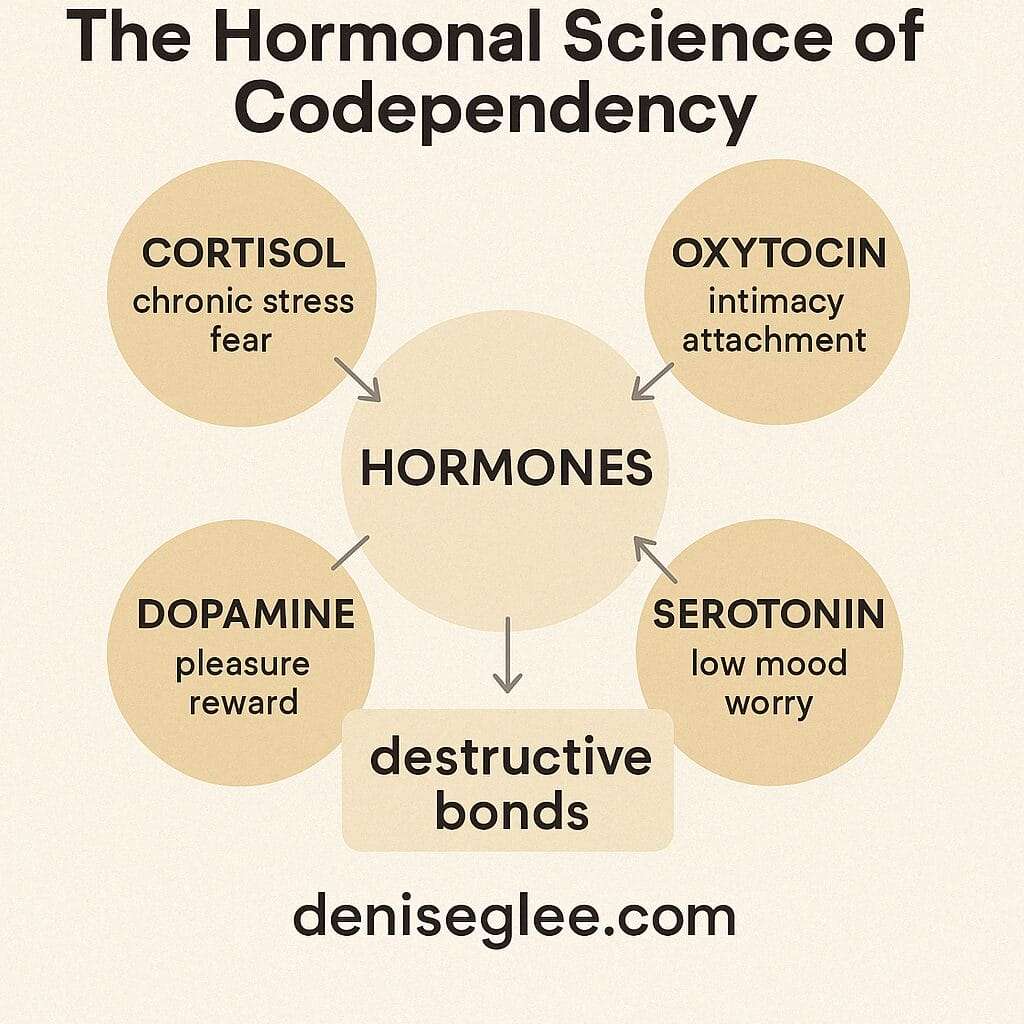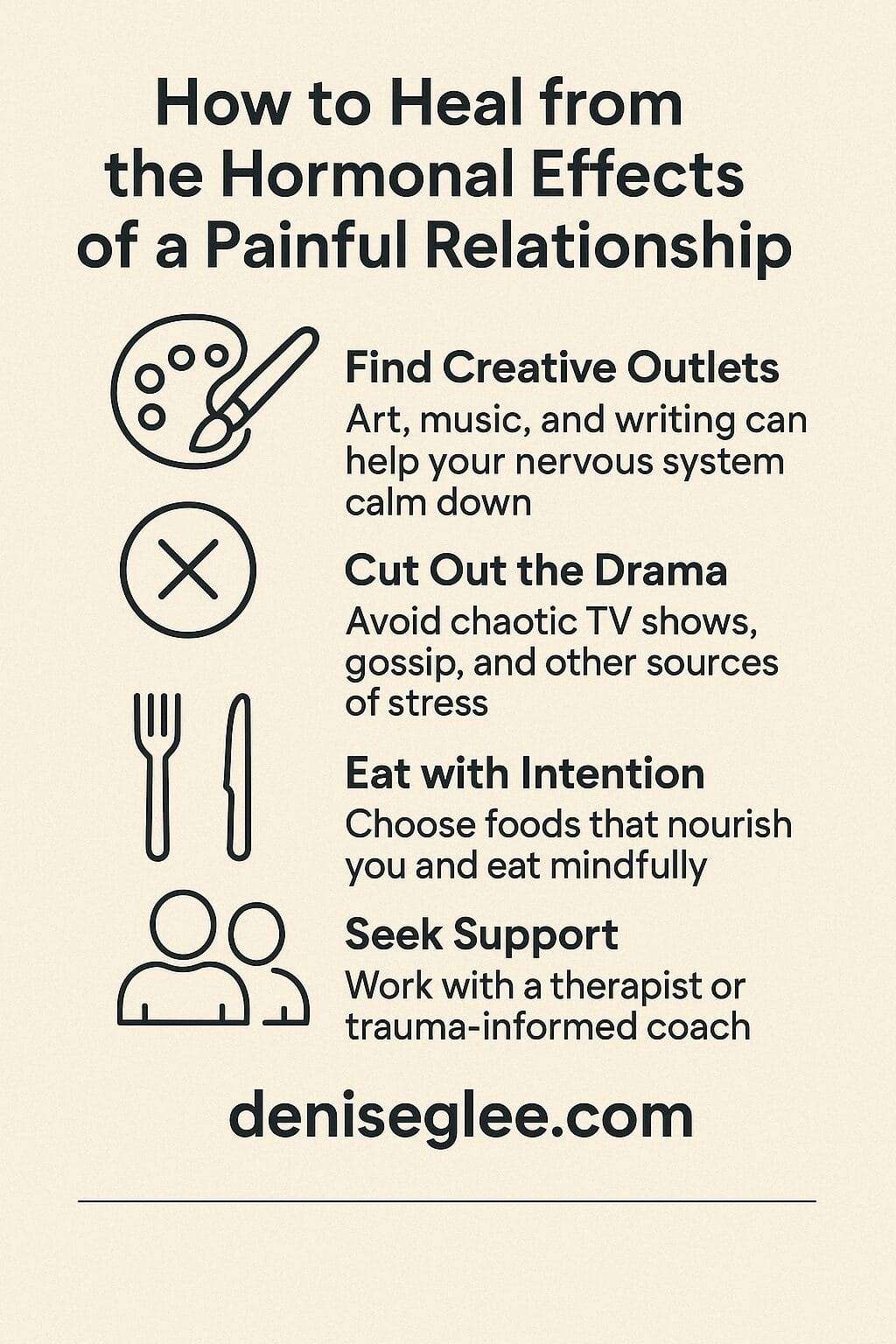- Updated: July 31, 2025
You know they’re not good for you.
But your body won’t let go.
This isn’t just about low self-worth or “daddy issues.”
This is about chemistry. Neurobiology. Addiction masked as connection.
When you stay stuck in love that hurts, it’s not because you’re broken.
It’s because your nervous system got wired to survive—not to thrive.
Let’s rip the shame off the science.
Your Hormonal Hook Map
How Neurotransmitters Hijack Your Reactions (Before You Can Think)
Ever flinched before touching a hot stove—or felt your stomach drop before a hard conversation?
That wasn’t overthinking. That was your nervous system reacting in real time.
Neurotransmitters are the chemical messengers that make it happen. They fire fast—like 270 miles-per-hour fast. They carry signals between your brain and body to protect you from danger, discomfort, or perceived threat.
But here’s where it gets tricky:
They don’t just respond to physical harm.
They respond to emotional stress, too.
So when you’re in a relationship that feels unpredictable, tense, or emotionally unsafe?
Those same messengers can override logic—and trigger fight, flight, freeze, or fawn—before you’ve even had time to think.
Now layer hormones on top of that?
You’re not just reacting.
You’re stuck in a loop your body has learned to survive.

Hormones vs. Neurotransmitters: The Tug-of-War Inside You
It’s easy to lump them together—both influence how you feel, react, and bond.
But they’re not the same. And understanding the difference helps you see why you keep getting pulled back into chaos.
| Messengers | What They Do | What They Don’t |
|---|---|---|
| Neurotransmitters | Send quick electrical signals between nerve cells. | Can’t travel through your bloodstream or shape long-term patterns. |
| Hormones | Regulate slower, body-wide systems like digestion, stress, and growth. | Can’t fire off fast, targeted responses in real time. |
These two systems don’t compete—they collaborate.
And when they link up during emotional events—especially in relationships—they hijack your brain.

They Don’t Just Nudge You. They Take Over.
That surge of longing?
The racing heart when he texts?
The panic when you try to leave?
That’s not just “feeling too much.” That’s your chemical wiring kicking in.
Once hormones and neurotransmitters team up during stress or intimacy, logic isn’t leading anymore—your body is.
It doesn’t matter if the relationship is toxic.
If he ghosts you, gaslights you, or only shows up half the time.
If your system associates that chaos with love, it will keep pulling you back.
Your body doesn’t want clarity.
It wants familiar.
Cortisol Overload: When Stress Becomes an Addiction
One client told me she hated the fights but loved the makeup sex. It wasn’t just the drama. It was the chemical payoff.
Cortisol helps your body respond to danger. But when it stays high for too long, it backfires—causing anxiety, brain fog, and heart problems.
Still, your brain learns to crave it. Cortisol becomes the familiar storm.
In the next section, we’ll discuss specific neurotransmitters that act as hormones, making us do the most inexplicable things in the name of “love,” or rather, fear of being abandoned and rejected.
Each one rewards the relationship—even if it’s dysfunctional.
Let’s break it down:

Oxytocin: The “Bonding” Chemical That Keeps You Stuck
Oxytocin is often called the “love hormone.” It’s the chemical behind bonding—the one that kicks in during sex, cuddling, or late-night confessions that feel deeper than they are. It’s what makes you feel close, even when every red flag is screaming, run.
But here’s the problem:
Oxytocin doesn’t care if he respects you.
It doesn’t care if he lies, ghosts, or gaslights.
It just cares that he’s near.
Dr. Pat Allen, a longtime family therapist, once said:
“As soon as a man puts his penis into your mouth, anus, or vagina, you’re hooked.”
Crude? Yes.
Wrong? Not at all.
Looking back on my single years, I can see how many situations I stayed in that should’ve ended on day two. No emotional connection. No communication. Just physical intimacy way too early—and a body that confused closeness with commitment.
Why You Can’t Just “Get Over Him”: The Illusion of Bonding
Ever dated a guy for two months, then spent the next two years missing him?
That’s not heartbreak. That’s oxytocin doing its thing.
When there’s any form of penetration—yes, vaginal, oral, or anal—your body releases oxytocin. And that bond? It can biologically linger for up to three years.
Here’s why: your body assumes you’re trying to make a baby. And nature wants that baby to survive.
It takes around three years for a child’s mirror neurons to fully develop. So your brain’s wiring tries to keep the “family” together—whether or not the guy’s actually safe, stable, or sane.
You’re not in love. You’re in a trance.
A hormonal loop that says, Stay close. This is survival.
I can’t tell you how many “entanglements” I stayed in—not because I believed in the relationship, but because my body had already made the bond. It shouldn’t be shocking that I developed an addiction to love.
Dopamine and Denial: Why the Good Moments Keep You Hooked
Dopamine is your brain’s “feel-good” chemical. It spikes when you anticipate pleasure—and that’s where the trouble begins.
In toxic relationships, your brain becomes obsessed with the good moments. The laughs. The sex. That one weekend he actually showed up for you.
You ignore the cheating, the gaslighting, the disrespect—because dopamine reinforces the fantasy. You’re not just stuck in the past. You’re stuck in a reward loop.
This is the neuroscience behind the “on-again, off-again” mess. It’s not weakness. It’s wiring.
Low Serotonin: The Reason You Can’t Stop Checking His Instagram
Serotonin helps regulate mood and obsessive behavior. When it’s low, you can’t stop spinning.
Ever reread old texts? Replayed arguments in your head? Checked his Instagram even though you swore you wouldn’t?

That’s not you being dramatic. That’s serotonin depletion. Your brain is trying to stabilize itself—but it’s doing it by obsessing over the person who destabilized you.
The best example? Glenn Close in Fatal Attraction.
Obsessed. Frantic. Boiling rabbits.
You might not go that far, but you feel that intense pull. That’s not love. That’s neurochemistry gone rogue.
Endorphins: Why Pain Starts to Feel Like Home
Endorphins are your body’s natural painkillers. They get released during physical or emotional stress to help you survive.
But here’s where it gets twisted: sometimes, those endorphins actually make you feel good while you’re being hurt.
That’s why victims in abusive relationships may describe feeling high after an intense fight—or oddly calm in the middle of chaos.

I once heard a story of a woman who returned to her husband after he hospitalized her. She said, “He’s just stressed from work.”
She wasn’t just rationalizing. Her body was flooded with endorphins, numbing the trauma and creating a bizarre sense of loyalty.
The brain was trying to protect her.
But it was also keeping her stuck.
Up next: how to heal when your body is still hooked.
(And yes, you can unhook. Even from this.)
Healing the Hormonal Hangover: How to Rewire After Chaos
Getting out of a painful relationship isn’t the finish line—it’s the detox.
When your body’s been running on stress hormones, adrenaline spikes, and chemical bonding for months (or years), you don’t just “move on.” You have to reset your system.
Here’s how to start clearing out the emotional residue and get your body and brain back to baseline:

1. Find Creative Outlets
You don’t need to be an artist—you just need a release valve.
Paint. Journal. Make playlists. Scribble messy poetry. Learn the guitar. Creativity helps your nervous system shift out of survival mode. It lets your brain feel pleasure that isn’t tangled in conflict or chaos.
2. Cut the Drama
Your body can’t heal if your screen time is full of screaming matches, murder docs, or messy reality TV.
I’m not saying go full monk—but know this: watching drama keeps your system wired for it. Your brain starts thinking chaos is normal.
Swap some of that stimulation for calm: nature shows, silence, music that soothes instead of spikes.
3. Eat Like You’re Rebuilding Something
Food is mood. What you eat literally becomes your neurotransmitters.
So no, it’s not “just a snack.” It’s your recovery fuel. Slow down. Choose real food. Pay attention to how it makes you feel.
Your brain can’t stabilize if your blood sugar is crashing every two hours.
4. Get Help. Real Help.
You don’t have to figure this out alone. You’re not weak for needing support—you’re wise.
Whether it’s a therapist, coach, or support group, having someone help you process the emotional weight can make all the difference. Especially someone trained in trauma or messiness that comes from romantic codependency.
Each of these steps isn’t just self-care—it’s chemical recovery.
Give yourself grace. Your brain is rewiring. Your body is learning what calm feels like again. That’s the work.
Up next: the final thoughts you didn’t know you needed.

You’re Not Weak. You’re Wired—But You Can Break Free
If you’ve made it this far, then some part of you already knows—this isn’t just emotional.
It’s biological. Psychological. Neurological.
This isn’t about repeating affirmations or blasting empowerment playlists.
It’s about undoing chemical bonds that were wired through trauma, loneliness, or survival.
If you’ve felt stuck…if you’ve gone back to someone who hurt you…if you’ve confused chaos with chemistry—you’re not weak. You’re responding to years of internal patterning.
But patterns can be broken.
I hope this article gave you more than insight. I hope it gave you permission.
Permission to:
Leave—emotionally, then physically, and finally, spiritually.
Get help—ask someone to support you in breaking the habits that hurt you.
Stop waiting for them to change—no more holding onto hope that was never really there.
You don’t have to do it alone. And you don’t have to keep pretending it’s not that bad. Now you learn to trust yourself.
Have you been through a painful relationship?
I’d love to hear your story—because your truth might help someone else feel less alone.
👉 Share your experience here.
If you want support:
- 🎯 Learn how I support clients in breaking patterns and building something healthier—emotionally, mentally, and relationally.
- 🎙️ Or tune in to my podcast for raw, real conversations on trauma, healing, and what it actually means to grow.
You can get free. You can feel whole.
And you don’t have to wait for the perfect moment.
Start with the next decision you make.



